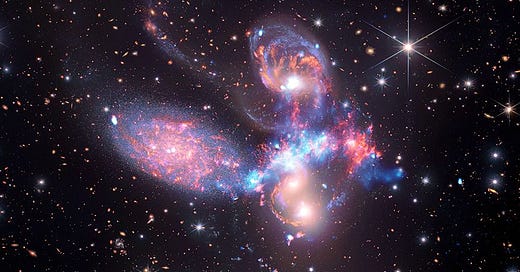Following on from the previous posting — Minimum Viable Cosmology - 1 — in this posting, we’ll attempt to answer the first question: Why is there ‘something’ instead of nothing?
The question itself is a paradox, as it assumes that 'nothing' is the default state of existence, and 'something' is an anomaly that needs explanation. However, this assumption is not necessarily accurate. The concept of 'nothing' is a human construct, an idea that we have created to describe the absence of 'something.' In reality, 'nothing' may not even exist.
From a scientific perspective, the Big Bang theory provides a plausible explanation for the existence of 'something.' According to this theory, the universe began as a singularity, a point of infinite density and temperature, approximately 13.8 billion years ago. This singularity then expanded and cooled, eventually forming galaxies, stars, planets, and everything else we see in the universe today. However, this theory does not explain why the singularity existed in the first place, or what caused it to expand.
From a quantum physics perspective, it suggests that even in a perfect vacuum, which we might consider as 'nothing,' there are still quantum fluctuations, tiny changes in energy that can spontaneously create particles and antiparticles. This implies that 'nothing' is unstable, and 'something' will always arise from it. However, this still does not answer why there are quantum fluctuations, or why they have the properties they do.
Philosophy has long been concerned with understanding the nature of reality, and over the centuries, various philosophical outlooks or perspectives have emerged. Here are some of the most prominent ones:
1. Realism: Realism asserts that reality exists independently of our perception or understanding. It posits that there are objective truths and facts about the world that remain constant, regardless of individual or collective beliefs, feelings, or interpretations. However, it struggles to explain how we can have direct knowledge of the external world, given that our access to it is mediated by our senses and cognitive processes. (More about this when we come to Question #4)
2. Idealism: Contrary to realism, idealism posits that reality is fundamentally mental or immaterial. It suggests that our understanding and perception of the world shape our reality. In other words, the mind and its ideas constitute the essence of reality. However, it struggles to explain the apparent objectivity and consistency of the world, which seems to exist independently of our perceptions.
3. Materialism: This philosophical outlook argues that the physical world, composed of matter and energy, is the only reality. It denies the existence of immaterial entities like souls or spirits and suggests that even our thoughts and consciousness can be explained in terms of material interactions. However, It struggles to explain consciousness, subjective experiences, and mental phenomena, often referred to as the "hard problem" of consciousness.
4. Dualism: Dualism holds that reality consists of two fundamental types of substances or entities. Most commonly, these are identified as the physical (or material) and the mental (or spiritual). This perspective is often associated with religious or spiritual beliefs. However, It struggles to explain how the physical and mental substances interact. This is often referred to as the mind-body problem.
5. Existentialism: This philosophical outlook emphasizes individual existence, freedom, and choice. It posits that individuals create the meaning and essence of their lives, as opposed to it being predetermined by deities or authorities. However, it can be criticized for being overly subjective and neglecting the social, cultural, and material conditions that shape human existence.
6. Postmodernism: Postmodernism rejects grand theories and ideologies as well as the notion of objective reality, focusing instead on the subjective experiences of individuals and the complexity and instability of the human condition. However, It can be criticized for being overly skeptical, relativistic, and lacking in positive content.
Each of these philosophical outlooks offers a different lens through which to view and understand reality, and each has its own strengths and weaknesses. They reflect the complexity of philosophical thought and the ongoing quest to comprehend the nature of our existence and the world around us.
In summary, from the views expressed in the above video and the Minimum Viable Cosmology (MVC) — we can say that quantum vacuum fluctuations and consciousness were fundamental building blocks of the universe.
Click here for Question #2




